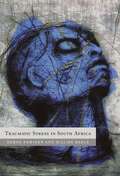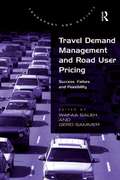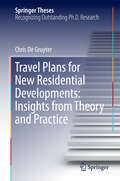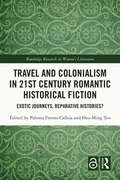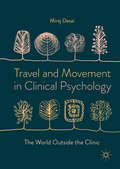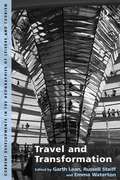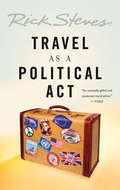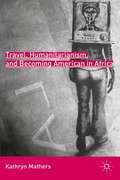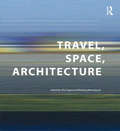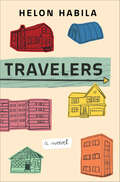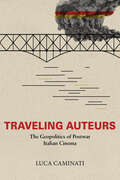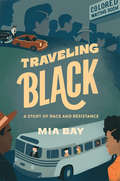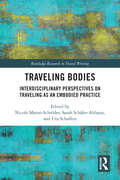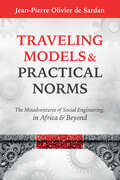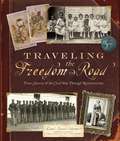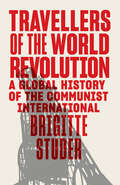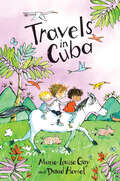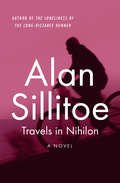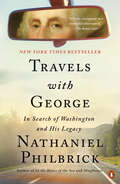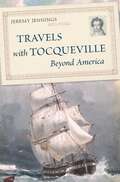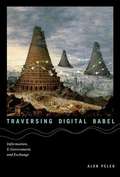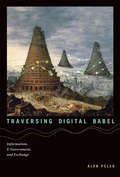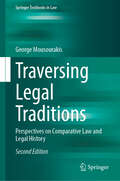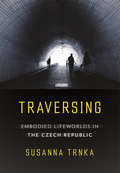- Table View
- List View
Traumatic Stress in South Africa
by Debbie Kaminer Gillian EagleTraumatic Stress in South Africa deals with the topic of traumatic stress from a number of angles.Traumatic stress, and posttraumatic stress more particularly, has gained international prominence as a condition or disorder that affects people across the globe in the wake of exposure to extreme life events, be these collective or individual. Given the history of political violence in South Africa, extremely high levels of violence against women and children and the prevalence of violent crime, South Africa has the unfortunate distinction of being considered a real life laboratory in which to study traumatic stress. Taking both a historical and contemporary perspective, the book covers the extent of and manner in which traumatic stress manifests, including the way in which exposure to such extremely threatening events impacts on people's meaning and belief systems. Therapeutic and community strategies for addressing and healing the effects of trauma exposure are comprehensively covered, as well as the particular needs of traumatised children and adolescents. Illustrative case material is used to render ideas accessible and engaging. The book also provides a comprehensive and up-to-date overview of theory and practice in the field of traumatic stress studies, incorporating both international and South African specific findings. The particular value of the text lies in the integration of global and local material and attention to context related challenges, such as how trauma presentation and intervention is coloured by cultural systems and class disparities. The book highlights both psychological and sociopolitical dimensions of traumatic stress.
Travel Demand Management and Road User Pricing: Success, Failure and Feasibility (Transport And Society Ser.)
by Gerd SammerThroughout the world, traffic levels are increasing and, in urban areas, these increasing levels have led to pressures on the road networks which are causing serious economic, environmental and social problems. This book examines the full range of 'push and pull' Travel Demand Management measures. This covers areas of regulatory, pricing, planning and persuasive policies to encourage individuals to make their trips in off-peak periods, by a different mode or to find another way of carrying out the trip purpose. Applying such measures can result in a more efficient transport system, improved environmental conditions and improvements in safety as well as revenue generation for use on alternative transport systems. The editors conclude with a summary of findings within the book and suggestions for best future practice.
Travel Plans for New Residential Developments: Insights from Theory and Practice
by Chris De GruyterThis thesis explores the use of travel plans for new residential developments as a tool for managing car use and encouraging the use of more sustainable forms of transport. It provides coverage of the scale of travel planning practice for new developments, industry perspectives on their development and implementation, and an assessment of their quality and effectiveness. It combines implementation theory and planning enforcement theory to identify opportunities to enhance the effectiveness of travel plans for new residential developments and to guide future travel planning practice. This thesis is useful and will appeal to both researchers and practitioners involved in transport planning for new residential developments.
Travel and Colonialism in 21st Century Romantic Historical Fiction: Exotic Journeys, Reparative Histories? (Routledge Research in Women's Literature)
by Hsu-Ming Teo Paloma Fresno-CallejaRomantic fiction has often involved stories of travel. In narratives of the journey towards love, "romance" often involves encounters with "exotic" places and peoples. When history is invoked in such stories, the past itself is exoticised and treated as "other" to the present to serve the purposes of romanticisation: a narrative strategy by which all manner of things – settings, characters, costumes, customs, consumables – are made to perform a luxuriant otherness that amplifies the experience of love. This volume questions the reparative function of Anglophone romantic historical fiction to ask: can plots of travel and discourses of tourism empower women while narrating stories of healing for the wounds of the past? This is the first volume to consider how romanticised and exoticised women’s historical fiction not only serves the purposes of armchair travel but may also replicate colonial discourse, unintentionally positioning readers as neocolonial, neo-Orientalist cultural voyeurs as well as voyagers.
Travel and Movement in Clinical Psychology: The World Outside The Clinic
by Miraj DesaiThis book concerns clinical psychology, but it is most concerned with the world outside the clinic. That world—where culture, history, and economy are found—radically impacts the public’s mental health. However these worldly considerations often do not feature centrally in the science and practice of clinical psychology, a subfield of psychology seemingly dedicated to mental health. Desai offers a corrective by travelling out of the clinic and into the world, exploring ideas, movements, and thinkers that help broaden our approach to well-being, by situating it within its cultural, historical, and sociopolitical contexts. The book aims to be an intercultural journey itself—encountering Buddhism, phenomenology, Edmund Husserl, Mahatma Gandhi, and Rev. Dr. Martin Luther King, Jr. along the way. Featuring a Foreword by Jeffrey Sachs, the book positions pressing matters such as social justice, racial justice, and environmental justice as integral components of good mental health work. The book will be of interest to readers interested in cultural and community approaches to psychological science and practice.
Travel and Transformation: Exploring New Territory (Current Developments In The Geographies Of Leisure And Tourism Ser.)
by Garth Lean Russell StaiffTravel and tourism have a long association with the notion of transformation, both in terms of self and social collectives. What is surprising, however, is that this association has, on the whole, remained relatively underexplored and unchallenged, with little in the way of a corpus of academic literature surrounding these themes. Instead, much of the literature to date has focused upon describing and categorising tourism and travel experiences from a supply-side perspective, with travellers themselves defined in terms of their motivations and interests. While the tourism field can lay claim to several significant milestone contributions, there have been few recent attempts at a rigorous re-theorization of the issues arising from the travel/transformation nexus. The opportunity to explore the socio-cultural dimensions of transformation through travel has thus far been missed. Bringing together geographers, sociologists, cultural researchers, philosophers, anthropologists, visual researchers, literary scholars and heritage researchers, this volume explores what it means to transform through travel in a modern, mobile world. In doing so, it draws upon a wide variety of traveller perspectives - including tourists, backpackers, lifestyle travellers, migrants, refugees, nomads, walkers, writers, poets, virtual travellers and cosmetic surgery patients - to unpack a cultural phenomenon that has captured the imagination since the very first works of Western literature.
Travel as a Political Act (Rick Steves)
by Rick StevesChange the world one trip at a time. In this illuminating collection of stories and lessons from the road, acclaimed travel writer Rick Steves shares a powerful message that resonates now more than ever.With the world facing divisive and often frightening events, from Trump, Brexit, and Erdogan, to climate change, nativism, and populism, there's never been a more important time to travel.Rick believes the risks of travel are widely exaggerated, and that fear is for people who don't get out much. After years of living out of a suitcase, he still marvels at how different cultures find different truths to be self-evident. By sharing his experiences from Europe, Central America, Asia, and the Middle East, Rick shows how we can learn more about own country by viewing it from afar.With gripping stories from Rick's decades of exploration, this fully revised edition of Travel as a Political Act is an antidote to the current climate of xenophobia. When we travel thoughtfully, we bring back the most beautiful souvenir of all: a broader perspective on the world that we all call home.All royalties from the sale of Travel as a Political Act are donated to support the work of Bread for the World, a non-partisan organization working to end hunger at home and abroad.
Travel, Humanitarianism, and Becoming American in Africa
by Kathryn MathersTravel, Humanitarianism, and Becoming American in Africa uses observations of American travelers to southern Africa to ask: why is Africa so important to Americans? These travel stories show how encounters with Africans lead to a problematic desire to save Africa. Kathryn Mathers argues that this is then seen as a way to resolve the tensions between aspirations for a globally responsible America and the current reality of its geopolitical role. This book draws fascinating new conclusions about the connections and disconnections on which contemporary American identity is formed.
Travel, Space, Architecture (Design And The Built Environment Ser.)
by Miodrag MitrasinovicTravel, Space, Architecture defines a new theoretical territory in architectural and urban scholarship that frames the processes of spatial production through the notion of travel. By aligning architectural thinking with current critical theory debates, this book explores whether dissociating culture from place and identity, and detaching the idea of architecture from both, can reframe our understanding of spatial and architectural practices. The book presents seventeen key case studies from a diverse range of perspectives including historical, theoretical, and praxis-based, and range from interrogations of architectural travel and notions of belonging and nationhood to challenging established geopolitical hierarchies.
Travelers: A Novel
by Helon HabilaA Boston Globe Best Book of 2019 “This is the answer to the question of what contemporary fiction can do.” —Edward Docx, GuardianAccompanying his wife on a prestigious arts fellowship in Berlin, a Nigerian scholar finds there are no walls between his privileged, secure existence and the stories of others in the African diaspora, including a transgender film student seeking the freedom to live an authentic life, a Libyan doctor who lost his wife and son in the waters of the Mediterranean, and a Somalian shopkeeper who tried to save his young daughter from a marriage forced upon her by a militant commander. Both unsettling and luminous, Travelers is a lean, heartrending exploration of loss and connection. Award-winning author Helon Habila inscribes unforgettable signposts that mark the universal journey in pursuit of love and home.
Traveling Auteurs: The Geopolitics of Postwar Italian Cinema (New Directions in National Cinemas)
by Luca CaminatiWhat tensions characterized the relationships between cinema, European Leftists, and emerging postcolonial ideologies after World War II? In Traveling Auteurs, author Luca Caminati analyzes the work of influential Italian filmmakers Roberto Rossellini, Pier Paolo Pasolini, and Michelangelo Antonioni as they engaged politically and aesthetically with the global landscapes and politics of the Cold War period. As documentaries, the films considered in this book record specific manifestations of political sensibilities of the twentieth century. As bodies of work, they reveal that the traveling auteurs who made them were symptomatic actors in complex geopolitical networks. As cultural objects reflecting and shaping contemporaneous debates, they provoke a complex afterlife at home and abroad. In the three chapters dedicated to Rossellini in India, Pasolini in Africa and the Middle East, and Antonioni in China, Caminati pays particular attention both to the reception that these films had in the countries where they were shot and to their legacies in Italian film history. As it follows the entanglements of filmmakers, artists, and activists involved as allies or direct witnesses to momentous political change, this book sheds new light on anticolonial struggles, the reaffirmation of the Non-Aligned Movement, and the consolidation of the Chinese Communist Party.
Traveling Black: A Story of Race and Resistance
by Mia BayA riveting, character-rich account of racial segregation in America that reveals just how central travel restrictions were to the creation of Jim Crow laws—and why “traveling Black” has been at the heart of the quest for racial justice ever since. Why have white supremacists and civil rights activists been so focused on Black mobility? From Plessy v. Ferguson to #DrivingWhileBlack, African Americans have fought for over a century to move freely around the United States. Curious as to why so many cases contesting the doctrine of “separate but equal” involved trains and buses, Mia Bay went back to the sources with some basic questions: How did travel segregation begin? Why were so many of those who challenged it in court women? How did it move from one form of transport to another, and what was it like to be caught up in this web of contradictory rules? From stagecoaches, steamships, and trains to buses, cars, and planes, Traveling Black explores when, how, and why racial restrictions took shape and brilliantly portrays what it was like to live with them. “There is not in the world a more disgraceful denial of human brotherhood than the ‘Jim Crow’ car of the southern United States,” W. E. B. Du Bois famously declared. Bay unearths troves of supporting evidence, rescuing forgotten stories of undaunted passengers who made it back home despite being insulted, stranded, re-routed, and ignored. Black travelers never stopped challenging these humiliations and insisting on justice in the courts. Traveling Black upends our understanding of Black resistance, documenting a sustained fight that falls outside the traditional boundaries of the Civil Rights Movement. A masterpiece of scholarly and human insight, this book helps explain why the long, unfinished journey to racial equality so often takes place on the road.
Traveling Bodies: Interdisciplinary Perspectives on Traveling as an Embodied Practice (Routledge Research in Travel Writing)
by Nicole Maruo-Schröder, Sarah Schäfer-Althaus, and Uta SchaffersTraveling Bodies: Interdisciplinary Perspectives on Traveling as an Embodied Practice explores the central role the body has in and for traveling and thus complements and expands upon existing research in travel studies with new perspectives on and insights in the entanglement of bodies and traveling. The case studies assembled in this volume discuss a variety of traveling practices, experiences, and media with chapters featuring Asian, American, and European historical and contemporary perspectives. Truly interdisciplinary in its approach, the volume identifies and examines diverse literary, historical and cultural texts, contexts, and modes in which traveling and the body intersect, including ‘classic’ travelogues, (new) media (e.g., film, digital travel apps), surf culture, and travel-inspired tattoos. The contributions offer various avenues for further research, not only for scholars working with body theory and travel (writing), but also for anyone interested in the intersections of literature, culture, media, and embodied practices of traveling.
Traveling Models and Practical Norms: The Misadventures of Social Engineering in Africa and Beyond
by Jean-Pierre Olivier de SardanPublic policies, development projects, and NGO interventions often have large gaps between the planning and execution. Standardized public policies, especially development ones, ignore the multiple contexts in which they are implemented. Local actors (those targeted by public policies or responsible for implementing them) play a major role in the implementation of planning and execution. Their many strategies for circumventing official directives and protocols follow implicit "practical norms" that are ignored by international experts. This book examines how different modes of governance that deliver services of general interest experience significant gaps between explicit rules and implicit practices, between planned actions and daily routines, in Africa and beyond.
Traveling the Freedom Road: From Slavery and the Civil War Through Reconstruction
by Linda Barrett OsborneIn association with the Library of Congress. From the perspective of those who lived through a time of pain, strife, and hope comes a powerful message for Black History Month and all year long. Told through unforgettable first-person accounts from slave narratives, journals, diaries, and other sources--much of it never before published for young people--this book is an overview of the antebellum South, the Civil War, and Reconstruction, 1800 to 1877. The perspectives of children and adults who lived through this time and witnessed its significant events are provided alongside photographs, engravings, news clippings, and other archival material held in the collections of the Library of Congress, and offer a poignant message for readers. A bibliography and an index round out the many offerings of this important addition to black history books for young readers.
Travellers in the Third Reich: The Rise of Fascism Through the Eyes of Everyday People
by Julia BoydTHE SUNDAY TIMES TOP THREE BESTSELLEROne of the Daily Telegraph's Best Books of 2017A Guardian 'Readers' Choice' Best Book of 2017The events that took place in Germany between 1919 and 1945 were dramatic and terrible but there were also moments of confusion, of doubt - of hope. How easy was it to know what was actually going on, to grasp the essence of National Socialism, to remain untouched by the propaganda or predict the Holocaust?Travellers in the Third Reich is an extraordinary history of the rise of the Nazis based on fascinating first-hand accounts, drawing together a multitude of voices and stories, including students, politicians, musicians, diplomats, schoolchildren, communists, scholars, athletes, poets, journalists, fascists, artists, tourists, even celebrities like Charles Lindbergh and Samuel Beckett. Their experiences create a remarkable three-dimensional picture of Germany under Hitler - one so palpable that the reader will feel, hear, even breathe the atmosphere.These are the accidental eyewitnesses to history. Disturbing, absurd, moving, and ranging from the deeply trivial to the deeply tragic, their tales give a fresh insight into the complexities of the Third Reich, its paradoxes and its ultimate destruction.
Travellers of the World Revolution: A Global History of the Communist International
by Brigitte StuderHope, Struggle and Defeat: The Communist International and the Global Fight for Freedom The Communist International was the first organised attempt to bring about worldwide revolution and left a lasting mark on 20th-century history. The book offers a new and fascinating account of this transnational organisation founded in 1919 by Lenin and Trotsky and dissolved by Stalin in 1943, telling the story through the eyes of the activists who became its &“professional revolutionaries.&” Studer follows such figures as Willi Münzenberg, Mikhail Borodin, M.N. Roy and Evelyn Trent, Tina Modotti, Agnes Smedley and many others less well-known as they are despatched to the successive political hotspots of the 1920s and &’30s, from revolutionary Berlin to Baku, from Shanghai to Spain, from Nazi Germany to Stalin&’s Moscow. It traces their journeys from revolutionary hope to accommodation, defeat or death, looking at questions of motivation and commitment, agency and negotiation, of life and love, conflict and frustration. In doing so, it reveals a forgotten Comintern, the expression of a multi-dimensional revolutionary moment, which attracted not only working-class but feminist, anti-racist, anti-colonial and anti-imperialist activists, highlighting the role of women in the Comintern and the centrality of anti-colonialism to the Communist project. The book concludes with a reflection on the ultimate demise of a historically unique undertaking.
Travels in Cuba (Travels with My Family)
by David Homel Marie-Louise GayEven for an experienced traveler like Charlie, Cuba is a place unlike any he has visited before — an island full of surprises, secrets and puzzling contradictions. When Charlie’s artist mother is invited to visit a school in Cuba, the whole family goes along on the trip. But the island they discover is a far cry from the all-inclusive resorts that Charlie has heard his friends talk about. Charlie has never visited a country as strange and puzzling as Cuba — a country where he often feels like a time traveler. Where Havana’s grand Hotel Nacional sits next to buildings that seem to be crumbling before his very eyes. Where the streets are filled with empty storefronts and packs of wild dogs, but where flowers and sherbet-colored houses may lie around the next corner, and music is everywhere. Where there are many different kinds of walls — from Havana’s famous sea wall to the invisible ones that seem aimed at keeping tourists and locals apart. Then the family heads “off the beaten track,” traveling by hot, dusty bus to Viñales, where Charlie makes friends with Lázaro, who often flies from Miami to visit his Cuban relatives. The boys ride a horse bareback, find a secret cache of rifles inside a little green mountain and go swimming with small albino fish in an underground cave. A rent-a-wreck takes the family into the countryside, where they find an abandoned hotel inhabited by goats, and a modern resort filled with tourists. And as he goes from one strange and marvelous escapade to another, Charlie finds that his expectations about a place and its people are overturned again and again. Key Text Features illustrations Correlates to the Common Core State Standards in English Language Arts: CCSS.ELA-LITERACY.RL.5.6 Describe how a narrator's or speaker's point of view influences how events are described.
Travels in Nihilon: A Novel
by Alan SillitoeFrom one of Britain&’s leading writers comes a biting satire about a country founded on Nihilism and a government gone mad Nihilon is a country where honesty is outlawed, drunk driving is mandatory, and nihilism reigns supreme. Five researchers are sent into the midst of this chaos to compile a new guidebook about the peculiar, unexplored land and its all-powerful leader, President Nil. Adam, Benjamin, Jaquiline, Edgar, and Richard attempt to gather information—but find themselves swept up by a nation turned upside down. As they navigate their way to the capital through artificial mist created by President Nil to disorient his people, the writers are stopped by ordinary citizens whom they quickly discover cannot be trusted. Adam accidentally starts a ground war, Benjamin is forced to buy a car, and Jaquiline discovers that robbery is not only legal, but encouraged. The researchers, who arrived as tourists, will find that although it is easy to enter Nihilon, it is much, much harder to escape. Alan Sillitoe, the bestselling author of The Loneliness of the Long-Distance Runner, crosses into uncharted territory in this comic dystopia that is as smart as it is engrossing.
Travels with George: In Search of Washington and His Legacy
by Nathaniel PhilbrickDoes George Washington still matter? Bestselling author Nathaniel Philbrick argues for Washington's unique contribution to the forging of America by retracing his journey as a new president through all thirteen former colonies, which were now an unsure nation. Travels with George marks a new first-person voice for Philbrick, weaving history and personal reflection into a single narrative. <P><P>When George Washington became president in 1789, the United States of America was still a loose and quarrelsome confederation and a tentative political experiment. Washington undertook a tour of the ex-colonies to talk to ordinary citizens about his new government, and to imbue in them the idea of being one thing--Americans. <P><P>In the fall of 2018, Nathaniel Philbrick embarked on his own journey into what Washington called "the infant woody country" to see for himself what America had become in the 229 years since. Writing in a thoughtful first person about his own adventures with his wife Melissa and their dog Dora, Philbrick follows Washington's presidential excursions: from Mount Vernon to the new capital in New York; a month-long tour of Connecticut, Massachusetts, New Hampshire, and Rhode Island; a venture onto Long Island and eventually across Georgia, South Carolina, and North Carolina. The narrative moves smoothly between the eighteenth and twenty-first centuries as we see the country through both Washington's and Philbrick's eyes. <P><P>Written at a moment when America's founding figures are under increasing scrutiny, Travels with George grapples bluntly and honestly with Washington's legacy as a man of the people, a reluctant president, and a plantation owner who held people in slavery. At historic houses and landmarks, Philbrick reports on the reinterpretations at work as he meets reenactors, tour guides, and other keepers of history's flame. He paints a picture of eighteenth century America as divided and fraught as it is today, and he comes to understand how Washington compelled, enticed, stood up to, and listened to the many different people he met along the way--and how his all-consuming belief in the Union helped to forge a nation. <P><P><b>A New York Times Best Seller</b>
Travels with Tocqueville Beyond America
by Jeremy JenningsA revelatory intellectual biography of Tocqueville, told through his wide-ranging travels—most of them, aside from his journey to America, barely known.It might be the most famous journey in the history of political thought: in 1831, Alexis de Tocqueville sailed from France to the United States, spent nine months touring and observing the political culture of the fledgling republic, and produced the classic Democracy in America.But the United States was just one of the many places documented by the inveterate traveler. Jeremy Jennings follows Tocqueville’s voyages—by sailing ship, stagecoach, horseback, train, and foot—across Europe, North Africa, and of course North America. Along the way, Jennings reveals underappreciated aspects of Tocqueville’s character and sheds new light on the depth and range of his political and cultural commentary.Despite recurrent ill health and ever-growing political responsibilities, Tocqueville never stopped moving or learning. He wanted to understand what made political communities tick, what elite and popular mores they rested on, and how they were adjusting to rapid social and economic change—the rise of democracy and the Industrial Revolution, to be sure, but also the expansion of empire and the emergence of socialism. He lauded the orderly, Catholic-dominated society of Quebec; presciently diagnosed the boisterous but dangerously chauvinistic politics of Germany; considered England the freest and most unequal place on Earth; deplored the poverty he saw in Ireland; and championed French colonial settlement in Algeria.Drawing on correspondence, published writings, speeches, and the recollections of contemporaries, Travels with Tocqueville Beyond America is a panoramic combination of biography, history, and political theory that fully reflects the complex, restless mind at its center.
Traversing Digital Babel
by Alon PeledThe computer systems of government agencies are notoriously complex. New technologies are piled on older technologies, creating layers that call to mind an archaeological dig. Obsolete programming languages and closed mainframe designs offer barriers to integration with other agency systems. Worldwide, these unwieldy systems waste billions of dollars, keep citizens from receiving services, and even -- as seen in interoperability failures on 9/11 and during Hurricane Katrina -- cost lives. In this book, Alon Peled offers a groundbreaking approach for enabling information sharing among public sector agencies: using selective incentives to "nudge" agencies to exchange information assets. Peled proposes the establishment of a Public Sector Information Exchange (PSIE), through which agencies would trade information. After describing public sector information sharing failures and the advantages of incentivized sharing, Peled examines the U.S. Open Data program, and the gap between its rhetoric and results. He offers examples of creative public sector information sharing in the United States, Australia, Brazil, the Netherlands, and Iceland. Peled argues that information is a contested commodity, and draws lessons from the trade histories of other contested commodities -- including cadavers for anatomical dissection in nineteenth-century Britain. He explains how agencies can exchange information as a contested commodity through a PSIE program tailored to an individual country's needs, and he describes the legal, economic, and technical foundations of such a program. Touching on issues from data ownership to freedom of information, Peled offers pragmatic advice to politicians, bureaucrats, technologists, and citizens for revitalizing critical information flows.
Traversing Digital Babel: Information, E-Government, and Exchange (Information Policy)
by Alon PeledA groundbreaking approach to information sharing among government agencies: using selective incentives to “nudge” them to exchange information assets.The computer systems of government agencies are notoriously complex. New technologies are piled on older technologies, creating layers that call to mind an archaeological dig. Obsolete programming languages and closed mainframe designs offer barriers to integration with other agency systems. Worldwide, these unwieldy systems waste billions of dollars, keep citizens from receiving services, and even—as seen in interoperability failures on 9/11 and during Hurricane Katrina—cost lives. In this book, Alon Peled offers a groundbreaking approach for enabling information sharing among public sector agencies: using selective incentives to “nudge” agencies to exchange information assets. Peled proposes the establishment of a Public Sector Information Exchange (PSIE), through which agencies would trade information. After describing public sector information sharing failures and the advantages of incentivized sharing, Peled examines the U.S. Open Data program, and the gap between its rhetoric and results. He offers examples of creative public sector information sharing in the United States, Australia, Brazil, the Netherlands, and Iceland. Peled argues that information is a contested commodity, and draws lessons from the trade histories of other contested commodities—including cadavers for anatomical dissection in nineteenth-century Britain. He explains how agencies can exchange information as a contested commodity through a PSIE program tailored to an individual country's needs, and he describes the legal, economic, and technical foundations of such a program. Touching on issues from data ownership to freedom of information, Peled offers pragmatic advice to politicians, bureaucrats, technologists, and citizens for revitalizing critical information flows.
Traversing Legal Traditions: Perspectives on Comparative Law and Legal History (Springer Textbooks in Law)
by George MousourakisThis textbook provides clear, reliable, and comprehensive insights into key topics in comparative law and legal history. As fundamental pillars of modern legal education, comparative law and legal history play a crucial role in shaping a new generation of legal scholars and practicing lawyers who appreciate the significance of legal diversity while recognizing the shared foundations of legal systems worldwide. By integrating these two disciplines, scholars and professionals can better understand the dominant features and developmental trajectories of various legal systems, fostering a broader, more culturally informed perspective on the law. This approach enables readers to develop the analytical skills and critical standards necessary to address the complexities of an increasingly interconnected and rapidly evolving legal landscape. The book is divided into two main parts. Part I explores the foundational principles of comparative law, tracing its historical evolution and examining its relationship with other areas of legal study. It provides an extensive overview of legal comparatism from classical antiquity to the modern period, with particular attention paid to the contributions of eighteenth- and nineteenth-century thinkers who helped shape the field. Additionally, it assesses the role of comparative law in contemporary legal scholarship, lawmaking, and judicial decision-making, highlighting its methodological approaches and practical applications in both domestic and international contexts. In turn, Part II examines the historical development and defining characteristics of major legal traditions. It begins with the Roman and civil law tradition, followed by an exploration of the English common law tradition, the Islamic legal tradition, and various indigenous legal traditions. Special attention is given to legal transplantation, including a case study on the Japanese legal tradition and its interactions with Chinese and Western legal influences. By integrating comparative law and legal history, this book provides readers with the knowledge and analytical tools needed to navigate diverse legal traditions and systems, promoting a deeper understanding of historical legacies and contemporary legal challenges.
Traversing: Embodied Lifeworlds in the Czech Republic
by Susanna TrnkaTraversing is about our ways of seeing, experiencing, and moving through the world and how they shape the kinds of people we become. Drawing from concepts developed by two phenomenological philosophers, Martin Heidegger and Jan Patočka, and putting them in conversation with ethnographic analysis of the lives of contemporary Czechs, Susanna Trnka examines how embodiment is crucial for understanding our being-in-the-world.In particular, Traversing scrutinizes three kinds of movements we make as embodied actors in the world: how we move through time and space, be it by walking along city streets, gliding across the dance floor, or clicking our way through digital landscapes; how we move toward and away from one another, as erotic partners, family members, or fearful, ethnic "others"; and how we move toward ourselves and the earth we live on.Above all, Traversing focuses on tracing the ways in which the body and motion are fundamental to our lived experience of the world, so we can develop a better understanding of the empirical details of Czech society and what they can reveal to us about the human condition.
